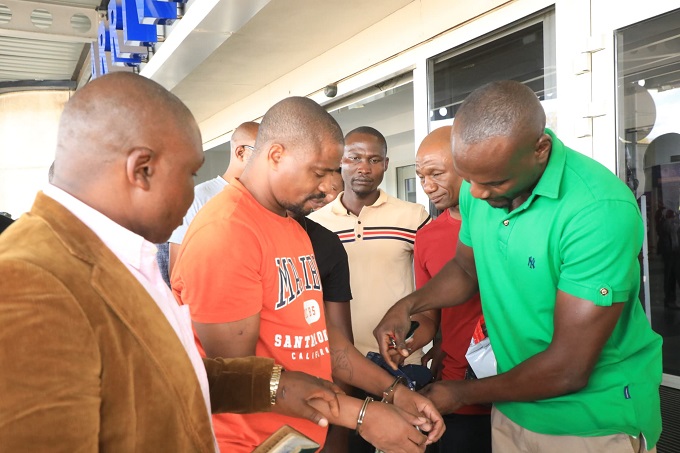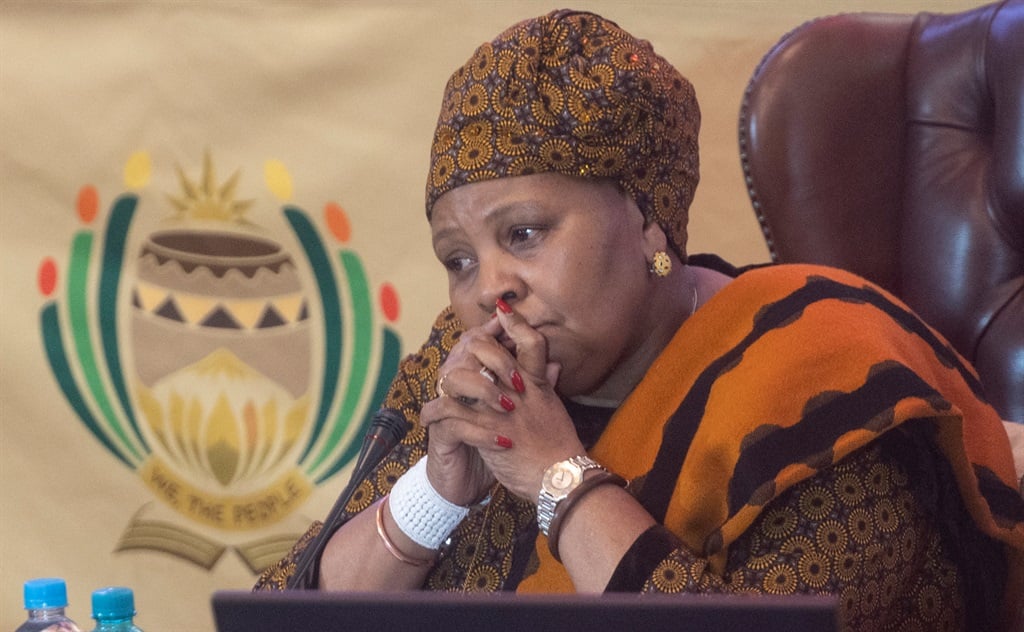REPORTABLE ZLR (78)
Judgment No. SC. 94/05
Civil Application No. 253/05
WICKNEL MUNODAANI CHIVHAYO v THE STATE
SUPREME COURT OF ZIMBABWE
HARARE, NOVEMBER 30, 2005
E Matinenga, for the Appellant
M Nemadire, for the respondent
Before: SANDURA JA, In Chambers, in terms of s 123(1)(a)(i) of the Criminal Procedure and Evidence Act [Chapter 9:07]
The Appellant (Chivhayo) was charged in the High Court with contravening s 63(1)(b) of the Serious Offences (Confiscation of Profits) Act [Chapter 9:17], which reads as follows:
63. Money-laundering
(1) A person shall be guilty of money-laundering if he
(a)
(b) receives, possesses, conceals, disposes of, brings into or removes from Zimbabwe, any money or other property which is the proceeds of crime;
and he knows or ought to have reasonably known that the money or other property was derived or realised, directly or indirectly, from the commission of an offence.
The allegations against Chivhayo were that on 4 and 5 July 2002 he unlawfully received some money which was the proceeds of crime and which was in the form of three cheques which he deposited into his bank account, and that on 4, 5, 6, 8, and 9 July 2002 he withdrew the money from his bank account and disposed of it, when he knew or ought to have known that the money was derived or realised, directly or indirectly, from the commission of an offence.
Alternatively, Chivhayo was charged with theft by false pretences, the allegation being that during the period extending from 28 June 2002 to 15 July 2002 he unlawfully and with intent to steal misrepresented to Digby Sean Nesbitt that he had deposited R837 000.00 into Shane Peter Nesbitts bank account in South Africa in exchange for $37 665 000.00, which sum Digby Sean Nesbitt was induced to hand over to him, whereas the sum of R837 000.00 had not in fact been deposited into Shane Peter Nesbitts bank account.
Chivhayo pleaded not guilty to both charges. He was, however, found guilty of the main charge and was sentenced to five years imprisonment with labour, of which two years imprisonment with labour was conditionally suspended. He applied for leave to appeal against the conviction but the application was dismissed by the learned Judge in the court a quo on the ground that there were virtually no prospects of success on appeal. His application for bail pending appeal was also dismissed.
Consequently, Chivhayo appealed against the learned Judges refusal to grant him leave to appeal and bail pending appeal. Both matters were placed before me in Chambers. After hearing both counsel, I granted the application for leave to appeal, but dismissed the application for bail pending appeal and gave my brief reasons for doing so. That was on 30 November 2005.
Subsequently, on 22 February 2006, Chivhayos legal practitioner requested the full reasons for my decision to uphold the learned trial Judges dismissal of the application for bail pending appeal. I now set them out.
In the first place, I was satisfied that the prospects of success on appeal were very slim indeed. However, notwithstanding that fact, I granted Chivhayo leave to appeal because I was reluctant to take the very serious step of denying him the opportunity to appeal against his conviction by the High Court.
As BARON JA said in S v Tengende and Ors 1981 ZLR 445 (S) at 446H-447A:
The decision whether or not to grant leave to appeal depends, of course, on prospects of success. But how good those prospects must be raises the important issue of approach. It would, I think, be a very serious step, and one which I would be reluctant to take save in a very clear case, to deny a man the opportunity to appeal from a conviction at first instance.
However, it does not follow that once leave to appeal is granted there is no reason for refusing bail pending appeal. In this regard, BARON JA had this to say in the Tengende case supra at 447H-448C:
In essence (counsels) argument reduces itself to this: once there are reasonable prospects of success on appeal there is no reason for refusing bail. This submission loses sight of the essential difference between bail pending trial and bail pending appeal. In either case bail is a matter for the discretion of the court, but bail pending trial will not normally be refused on charges of this nature (i.e. theft of a large amount of money) unless there are positive reasons for refusal, such as the danger of the accused absconding or of interference with witnesses. But bail pending appeal involves a new and important factor; the Appellant has been found guilty and sentenced to imprisonment. Bail is not a right. An Appellant for bail asks the Court to exercise its discretion in his favour and it is for him to satisfy the Court that there are grounds for so doing. In the case of bail pending appeal the position is not, even as a matter of practice, that bail will be granted in the absence of positive grounds for refusal; the proper approach is that in the absence of positive grounds for granting bail it will be refused.
Similar views were expressed by FIELDSEND CJ in The State v Williams 1980 ZLR 466 (S). At 468 F-H the learned CHIEF JUSTICE said:
On the other hand even where there is a reasonable prospect of success on appeal bail may be refused in serious cases notwithstanding that there is little danger of an Appellant absconding. Such cases as Rex v Milne and Erleigh (4) 1950 (4) SA 601 and R v Mthembu 1961 (3) SA 468 stress the discretion that lies with the judge and indicate that the proper approach should be towards allowing liberty to persons where that can be done without any danger to the administration of justice. In my view, to apply this test properly it is necessary to put in the balance both the likelihood of the Appellant absconding and the prospects of success. Clearly, the two factors are inter-connected because the less likely are the prospects of success the more inducement there is on an Appellant to abscond. In every case where bail after conviction is sought the onus is on the Appellant to show why justice requires that he should be granted bail.
In the present case, bearing in mind the fact that the prospects of success on appeal were very slim and the long prison sentence imposed by the High Court, I was satisfied that if released on bail Chivhayo would be greatly tempted to abscond. The ease with which a person can leave this country without a passport or other travel documents is well known.
Although in my ex tempore reasons for the refusal of bail pending appeal I referred to a letter written by a chief law officer in the Attorney-Generals Office to the registrar of the High Court, stating that Chivhayo had failed to appear before the trial judge on 6 and 14 July 2005, when the judgment was to be handed down, the contents of that letter were by no means the main reason for the refusal of bail.
In any event, this Court has stated in a number of cases the basis on which it would interfere with the High Courts decision on bail.
Thus, in S v Chikumbirike 1986 (2) ZLR 145 (SC) at 146 F-G BECK JA said the following:
The next matter to be decided is whether this Court in hearing the appeal should treat it as an appeal in the wide sense, that is to say, that it is to be treated as if it were a hearing de novo. Once again that matter has been decided by the case of The State v Mohamed 1977 (2) (SA) 531 at 542 B-C where TROLLIP JA said that in an appeal of this nature the Court of Appeal will only interfere if the court a quo committed an irregularity or misdirection or exercised its discretion so unreasonably or improperly as to vitiate its decision.
Similarly, in Aitken and Anor v Attorney-General 1992 (1) ZLR 249 (S) at 252 E-F GUBBAY CJ said:
While the JUDGE PRESIDENT, in considering the appeal, was at liberty to substitute his own discretion for that of the magistrate on facts placed before the latter, the present appeal is one in the narrow sense. The powers of this Court are, therefore, largely limited. In the absence of an irregularity or misdirection, this Court has to be persuaded that the manner in which the JUDGE PRESIDENT exercised his discretion was so unreasonable as to vitiate the decision reached. See S v Barber 1979 (4) SA 218 (D) at 220 E-G; S v Chikumbirike 1986 (2) ZLR 145 (S) at 146 F-G.
In the present case, Chivhayo failed to establish that in refusing bail pending appeal the learned trial Judge committed an irregularity or misdirection, or that the manner in which the learned Judge exercised his discretion was so unreasonable or improper as to vitiate his decision. There was, therefore, no basis on which I could have interfered with the learned Judges decision.
In the circumstances, the appeal against the learned trial Judges decision had to be dismissed.
Manase & Manase, Appellant’s legal practitioners








1 Comment